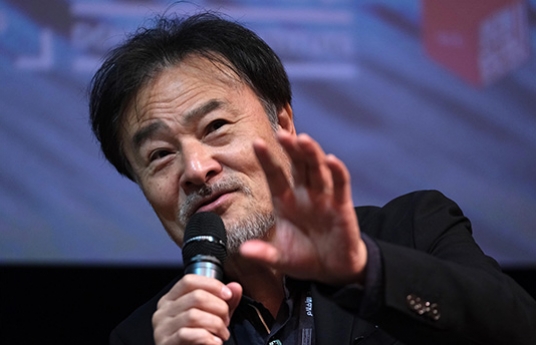Embrace the role of chance in filmmaking, says Qumra Master Kiyoshi Kurosawa
Mar 19, 2019

- Critically-acclaimed Japanese director believes that support and inspiration from friends, colleagues, and industry experts is also critical
Doha, Qatar: 19 March 2019: World-renowned Japanese auteur and Qumra Master Kiyoshi Kurosawa, who rose to international fame with cult horror movie Cure (1997), revealed that the secrets of his success in cinema: circumstance and a strong support network.
During the fourth Qumra Masterclass, Kurosawa shared his journey through filmmaking through clips from some of his most well-known films. Speaking about the success of Cure, he said: “I watched a lot of American horror movies growing up, and I had wanted to make a movie in that genre for some years. Then the growth in popularity of genre films made it easier for me to get the project financed and produced. So, circumstance was the key factor to the success of Cure, and it has continued to play an important role in my career ever since.”
Kurosawa went on to direct critically-acclaimed films such as License to Live (1998), Barren Illusion (1999), and Charisma (1999). His later film Tokyo Sonata (2008) won the Cannes Un Certain Regard Jury Prize, and Best Film at the 2009 Asian Film Awards.
“As directors, it is great when we can make the films that we want to make,” said Kurosawa of creative inspiration. “But films are not an individual process, they are collaborative. More often we make the films we are able to make, not the ones we want to make. If we’re lucky, once in a while the creative process transforms it into the film that you want to make.”
Kurosawa also spoke about the importance of building a trusted network of collaborators and mentors. While studying at Rikkyo University in Tokyo, he met film critic Shigehiko Hasumi and that this relationship “changed his life” and the way he saw film.
Kurosawa closed his Qumra Masterclass by overviewing his technical knowledge, including how he uses sound and texture effectively, and his love of the Super 8mm camera.
“I would advise new filmmakers to hone their skills on a Super 8. As a filmmaker it challenges you to translate what you see in front of you through the camera to get to in the final look and feel of the film. I think that process is very helpful, a challenge I really enjoy.”
The fifth edition of Qumra brings together more than 150 acclaimed filmmakers, industry professionals and experts to nurture 36 Qumra Projects by first and second-time filmmakers that are in various stages of development. The six-day event takes place 15–20 March at Souq Waqif and the Museum of Islamic Art. In addition to the Qumra Talks it features Qumra Master Classes and screenings in the Qumra Masters and New Voices in Cinema series.
Further details about ticket prices and sales for the screenings are now available on www.dohafilminstitute.com.